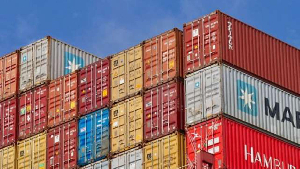The Ministry of Energy and Green Transition has revealed that only 40 out of the 2,637 containers consigned to the Electricity Company of Ghana (ECG) have been cleared at Tema Port, according to official data from port authorities.
In an interview on the Citi Breakfast Show on Tuesday, May 27, 2027, as monitored by GhanaWeb Business, the Public Relations Officer for the Ministry, Richmond Rockson, stated that the ongoing investigation into the long-standing issue of unaccounted-for ECG containers has uncovered significant discrepancies.
He said, “In fact, out of that number, the data provided to us by the port authorities suggests that ECG has cleared only 40 containers. That is the data we have now.”
This comes amid a joint investigation involving the Ministry of Transport, National Security, the Ghana Ports and Harbors Authority (GPHA), and the Customs Division of the Ghana Revenue Authority.
The probe was launched after earlier reports indicated that over 1,300 ECG containers were unaccounted for, more than doubling the initially reported figure.
Rockson emphasised that the new findings surpass the Ministry’s initial estimates.
He referenced a related discovery earlier this year, where ECG containers were found in a privately owned Indian warehouse through an auction process.
“Also, in March or April, some containers were retrieved from an Indian warehouse, where they disclosed that they had purchased them through an auction. That’s why the investigations are still ongoing. As of now, we are not certain of the number of containers ECG possesses because ECG’s own data reflects fewer containers than what we have retrieved. That is a matter of concern, and it points to the procurement practices over the years by past management,” he added.
He further criticised past procurement practices at ECG, highlighting purchases that he claims were wasteful and poorly managed.
“It’s unfair that a company like ECG would handle procurement this way. First, they buy goods that arrive at the port but are not delivered. Second, in some instances, they purchase goods they wouldn’t need for the next 15 years or already have enough stock for that duration. There are goods that have been bought but remain unused, and yet they continue to buy the same items,” he added.
SP/MA
Watch the latest edition of BizTech below:
Click here to follow the GhanaWeb Business WhatsApp channel



